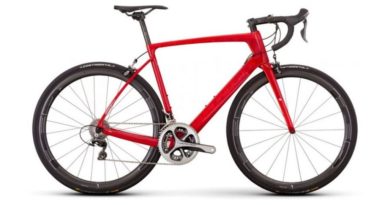EWS publishes 3 year injury study & concussion guidelines
The Enduro World Series (EWS) has shared the findings of a three year programme of research into enduro mountain biker health and injury.
The largest medical study ever undertaken in mountain biking, the study was undertaken to ascertain rider health and track injuries in an attempt to drive forward safer riding and competition for those involved in the sport.
The study is made up of two distinct pieces of research headed up by a team of sports scientists from Edinburgh Napier University and led by Dr Debbie Palmer, an expert in sports injury and illness epidemiology.
The first part of the study took injury information from over 2,000 athletes at 10 EWS races during 2017 and 2018 seasons. Just 8.9% of riders over the 10 races suffered an injury, a rate lower than that recorded for the XC MTB events in the Rio Olympic Games and lower than rates seen in rugby.
According to the study, shoulder and collarbone injuries are the most common type of accident to occur at EWS races. Interestingly, the rate of concussion was low – statistically a rider would have to race 263 EWS events to be in with a chance of suffering just one concussion, according to the study.
However, the women’s field suffered three times the number of concussions seen in the men’s field, identifying scope to develop this research further.
The study revealed that a third of riders don’t take any time off the bike after a concussion, with only 74% of riders aware concussion assessment protocols exist. To try to address this, EWS has released freely available ‘Pocket Guide to Concussion’ for race event staff, organisers and marshals, with a downloadable version also produced for riders.
The second piece of research conducted within the study was a rider health and injury survey of almost 2,000 riders from over 60 countries. Survey respondents included elite athletes, amateur racers and recreational riders.
The research showed that, again, enduro MTB riders are more at risk of suffering shoulder or collarbone injuries (25.6%) than any other. The responses also indicated that riders are more likely to suffer an injury on training or social rides than at a race (it’s perhaps worth noting here that most riders do more training and general riding than racing).
The survey showed that more female riders reported sustaining a significant injury compared with male riders, and with greater severity (around 55% compared to just under 40%).
EWS came up with a number of recommendations to try to prevent and lessen these figures at future events:
- -Riders should wear more protective equipment against lacerations and abrasions
- -Additional medical provision should be targeted by race event organisers around steep dirt and rocky race stages
- -Reassessment of qualification criteria for new EWS riders/local riders
- -A rider head injury assessment protocol should be included at race events
- -Introduction of ‘Red Flag’ concussion education for event marshalls
- -Withdraw riders from races who have been diagnosed with concussion
- -More concussion education information made available, including return to play (riding) guidelines
- -Provision for shoulder pre-habilitation and rehabilitation training exercises to help reduce the number/severity of shoulder injuries
- -First aid skills/awareness needed amongst riders
- -MTB industry should consider future development of shoulder protection products
The full study findings can be found here.



